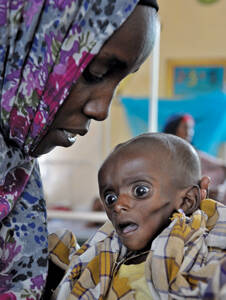Death rates among Somali refugees escaping a devastating famine has reached alarming levels, the United Nations refugee agency reported on Aug. 16. The U.N. High Commissioner for Refugees said that while malnutrition remained the greatest concern among camps of internally displaced people in Kenya, Ethiopia and within Somalia, outbreaks of measles were also responsible for many deaths. An assessment of the mortality rate in one of the four refugee camps in southern Ethiopia found that since June, an average of 10 children under the age of 5 have died every day.
“The combination of disease and malnutrition was what caused similar death rates in previous famine crises in the region,” said Adrian Edwards, a U.N. spokesperson in Geneva, adding that a measles vaccination campaign targeting children between the ages of 6 months and 15 years is ongoing. The majority of refugees arriving in Ethiopia from Somalia are from rural areas, and the camps may be the first time they have had access to health facilities.
The U.N. reports that the latest refugees into Ethiopia are in very poor condition and that 95 percent of them are women and children. A lack of shelter and health care, poor sanitation and overcrowding in the camps could lead to more outbreaks of disease.
As food aid landed in Somalia, U.N. workers distributed some 500 emergency assistance packages at a camp sheltering approximately 13,000 people, more than 2,000 families, close to the Mogadishu airport. The U.N.H.C.R. team described the conditions at the airport site as “grim and dire.” Voices of crying children were punctuated by heavy coughing. Small makeshift shelters with no sleeping mats or bedding are characteristic of the congested settlement. A number of children lying helplessly on the ground were suffering from measles, which refugees say are affecting many in the airport camp.
U.N. relief workers reported that the streets leading to the camp were calm, but that there was clear presence of armed men in the area. Before the current crisis, the Somali capital hosted some 370,000 internally displaced people, who have now been joined by an additional 100,000 who fled into the capital in search of food, water, shelter and medical assistance. Many said they were forced to leave elderly or disabled relatives behind, fearing that they would not survive the arduous journey to Mogadishu, which entailed walking for days without food or water. Some said they had been confronted by Shabab militants at roadblocks and discouraged from travelling to Mogadishu.








